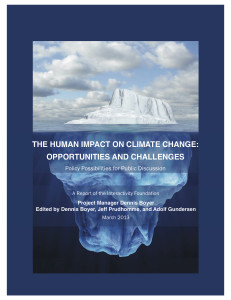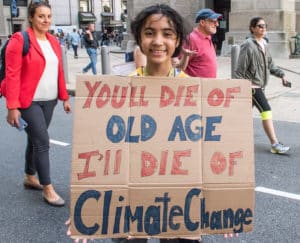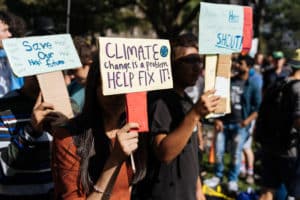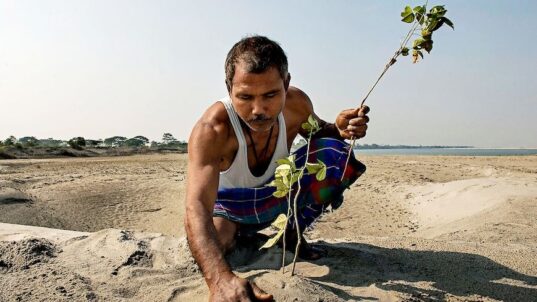 It would probably surprise few that the tone of climate change discussions has changed considerably over the years. I have been involved as facilitator, participant, or observer in over fifty such discussions over the last fifteen years. Early on I (and many others) thought the chief task of a climate discussion was to “bridge the gap” with those who doubted the science of climate change and try to find some common ground. I don’t question the motives of those who took this course, but I have come to see—at least for myself—that this energy was largely misspent in terms of how to move the needle policy-wise.
It would probably surprise few that the tone of climate change discussions has changed considerably over the years. I have been involved as facilitator, participant, or observer in over fifty such discussions over the last fifteen years. Early on I (and many others) thought the chief task of a climate discussion was to “bridge the gap” with those who doubted the science of climate change and try to find some common ground. I don’t question the motives of those who took this course, but I have come to see—at least for myself—that this energy was largely misspent in terms of how to move the needle policy-wise.
Some might go as far to say that idea of dialogue on climate has been an exercise in “gas-lighting” by those who reject significant change to the “carbon economy”. We are asked to ignore what the eyes of science reveal to us and to pay no attention to that man behind the fossil fuel curtain. We are left, at long last, with the sense that most who deny climate change are “true believers” hitched to an ideological cart and are manipulated by those invested in the status quo.
So what does a climate discussion involve these days? More and more, I am seeing an acknowledgement of loss and grief. There is a growing sense by those who know the science that thresholds have likely been passed and that some tipping points have already tipped. Then there is the sense of those who know policy-making that our governance institutions have failed us on a level not seen since our inability to rid ourselves of slavery without tremendous slaughter. Species will continue to disappear, habitats will be compromised, and much stress will be placed on human populations. That is happening and will continue to happen.
This is not to deny some areas of progress made on climate issues. There have been some technological advances that have bolstered sustainable energy. There are increasing economies of scale in alternatives that seemed unlikely a few decades ago. And it seems clear that the young people of this planet understand the nature of this threat in a deep way.
Yet when recent discussions share the grief and acknowledge the modest progress, they are still left with anger and frustration. If so many people see the “problem” why isn’t there meaningful change on a scale and urgency commensurate with the challenge? It almost always comes back to that matter of failed governance processes. If there was ever an issue (since slavery) that shows us that our system is not working, it is climate. Climate discussants sometimes conclude that there are many issues—some interrelated—that point out our failures, but climate has a way of putting the existential threat into sharp relief.
What features do discussants see in these failures? They see a yawning gap between the timelines that can be seen as reasonable and deliberative when dealing with pedestrian matters, but that border on negligence when faced with “all hands on deck” emergencies. They see systemic flaws regarding the influence of wealthy special interests that can be seen as purchasing policy outcomes at odds with substantial majority sentiment and planetary health. And they see a society where the religion of “more” as a ceaseless imperative has shaped everything from a jurisprudence that venerates private property to a system of global finance of “economies of extraction” to endless entreaties to just “go shopping”.
Thus I find today’s climate discussions to have little in common with those I first encountered back in 2004. Back then, sincere discussants were focused mostly on the sticks and carrots that might shift large scale industrial behavior. Over time the discussion enlarged to items like a carbon tax and incentives for alternative energy. And the menu was further filled out with policy measures large and small: green entrepreneurship, large institutions going carbon-neutral, divestment from “dirty” industries, personal consumer impact assessment tools and a raft of other worthwhile items. In the meantime global climate summits experienced increasing difficulty reaching objectives and United States policy on climate became, depending on your point of view, either a tragedy of the highest order or a national embarrassment.
Today’s discussions are far more sober in facing those disappointments and failures. They have a framing that takes into account the imminent threat of climate disaster. Most of those discussions now contain many of the same hard-nose elements. Climate change is not coming—it is here. Just because the problem proves difficult for conventional policy processes to grapple with does not grant us a reprieve from its dire consequences. History will judge those who failed to meet these challenges—and so should we. The technical solutions are available. What is lacking is the moral and political will. As a result it is becoming increasingly common for climate discussions to delve into matters like boycotts and civil disobedience. There is recognition that business as usual got us into this fix and it will not get us out.
Finally, there is another context that has been present in many of the recent climate discussions I am aware of: the impacts of climate change will be seen in inter-related ways across a number of human and biosphere concerns. We face no shortage of intractable problems in our third decade of this century. Almost all will be made worse by climate change. Income inequality? Life for those on the margins will not get better in world of weather extremes. Water supply and quality? Look out unsustainable cities in arid areas. Food security? It will be difficult to simply feed our increasing billions, much less support the cognitive growth and immune systems of our children.
These are the types of connections that seem to make otherwise dour climate discussions more hopeful. The understanding that climate is not a “stand-alone” issue that is unfolding in a static system. There are multiple interactions occurring in “real time” that need to be understood and accounted for: soil loss, water quality and supply, deforestation, food production, energy generation, transportation, public health and a host of other concerns. And there are multiple avenues of citizen action to be explored now that is becomes quite clear that voting and writing letters to legislators have run smack into the wall of entrenched interests. It’s those types of things that now engage those who are drawn to a “climate discussion”.
The current COVID-19 crisis has helped shed light on the possibilities of how to tackle “big problems”. Aside from the teachable moment of the cleaner air and cleaner water that has resulting from the shutdown of the economy, there are the human and structural lessons of who and what works in tough times. We have seen incredible sacrifices for the common good. We have seen rapid response, innovation, and deployment of trillions of dollars to combat disease. Why can’t that be done for climate protection? Why not mobilization on behalf of a sustainable economy that works for all? Increasingly, those who show up at climate discussions are asking, “why indeed?”.





